RUSH: We also have the Ted Koppel… You know, it’s amazing. I have to tell you… Oh, look at the clock. It was mid Feb… What is this? Late March. Mid-February I got the first call that Ted Koppel is doing a piece on modern media for a CBS Sunday Morning news program, and Koppel wants to come down here and interview me, a 45-minute interview. I said, “No.” Instinctively, right off the bat, I said, “No.” I have a backstory, a little history with Mr. Koppel, and I said, “There’s nothing… There’s nothing…” No, I just didn’t do it. I was tried…
My “people,” quote, tried to talk me into it. “Oh, it’s Ted Koppel! How could you? It’s CBS.” “Have you people learned nothing in 30 years? It’s exactly why not to do it!” I didn’t do it. I said, “I don’t need to do it. Why do I want to go on a program that’s gonna portray my success as the problem in American media? Why do I want to do it? Why would I…?” “You need to argue with them. You need to set ’em straight.” “It’s not gonna happen! It doesn’t work that way. I’ve learned over the years it doesn’t work that way.”
“But Ted Koppel, he used to really like you! You used to be on Nightline all the time.” “‘Used to’ is the operative phrase. Exactly right.” So Koppel did it… I knew he was gonna do it. He invited Hannity, and Hannity did it. You’ve probably seen the stories now where Koppel and Hannity are going at it, and Koppel tells Hannity he thinks he’s the problem with the media and with the country and so forth. It’s exactly what I thought it was gonna be. It’s exactly why I didn’t want to do it. And so we’ve got sound bites in this coming up, and maybe (if you care) some little backstory regarding my numerous appearances on Nightline.
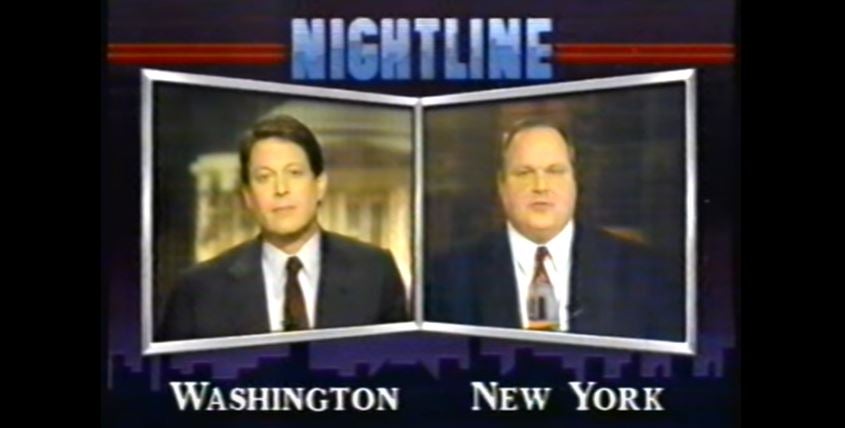 My first appearance on Nightline was to oppose Algore on climate change, global warming, environmentalism back then. And I remember, you know, I was so excited. I did it, and it was… Actually, I was very proud of my appearance, very happy. It’s a rare time in TV I thought I did okay. And that night and the next day all the think tanks and the environmentalist scientists just blew up. “Why’d they have some neophyte talk radio guy on instead of one of us? I mean, it wasn’t even a contest. Algore verse a talk show host?” They were just mad they hadn’t been asked to go on, and I’m sure I was asked to go on because I have not a scientist up against Algore. But I held my own — and, frankly, nuked ’em — and so I kept getting invited back.
My first appearance on Nightline was to oppose Algore on climate change, global warming, environmentalism back then. And I remember, you know, I was so excited. I did it, and it was… Actually, I was very proud of my appearance, very happy. It’s a rare time in TV I thought I did okay. And that night and the next day all the think tanks and the environmentalist scientists just blew up. “Why’d they have some neophyte talk radio guy on instead of one of us? I mean, it wasn’t even a contest. Algore verse a talk show host?” They were just mad they hadn’t been asked to go on, and I’m sure I was asked to go on because I have not a scientist up against Algore. But I held my own — and, frankly, nuked ’em — and so I kept getting invited back.
BREAK TRANSCRIPT
RUSH: So it was back in February sometime, I think early to mid-February I got a call from the PR people here at the EIB Network. And they said, “Ted Koppel called and he really wants to come down here and interview you for a half hour, 45 minutes on a feature that he’s putting together for the CBS Sunday show.” Sunday morning, not Face the Nation, but their early morning news show.
And I said, “What more can you tell me?”
“Well, it’s about the divide in the media today and he thinks you’re a key element there.”
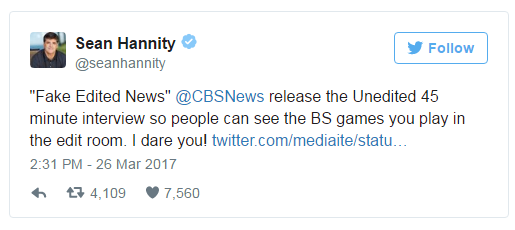 And my instincts, “Nope,” I said, “Nope, not gonna do it.” Right off the bat, just said, “Nope.” That’s my instinctive reaction to every interview request I get from anybody in the so-called mainstream media. And so the PR people, thinking it would be good PR for me to do it, said, “Come on, man, why don’t you do it? It’s CBS.”
And my instincts, “Nope,” I said, “Nope, not gonna do it.” Right off the bat, just said, “Nope.” That’s my instinctive reaction to every interview request I get from anybody in the so-called mainstream media. And so the PR people, thinking it would be good PR for me to do it, said, “Come on, man, why don’t you do it? It’s CBS.”
I said, “That’s another reason not to do it.”
“It it’s Ted Koppel for crying out loud, Nightline.”
“I know, but I’ve got a backstory there. Believe me, this cannot end up being anything good.”
“Come on, you gotta do it.”
“No.”
It was unusual. They very rarely try to talk me into things. So what I think happened was I think either Koppel personally called ’em or somebody high ranking in the producer network at CBS made a personal appeal. And they tried two more times, couple days go by, “You sure on the Koppel?”
“Yes, yes. I’m sure.”
And another couple days, “Are you sure on the Koppel?”
“Yes. I really don’t want to do it.”
“You haven’t been thinking about it at all?”
“Only that I’m glad I said I’m not gonna do it.”
“You haven’t even gotten close to maybe?”
“Nope. Nope. Every day goes by, I’m glad that I followed my instincts on this.”
And they said, “Okay.” And that’s the last I heard of it until yesterday when the feature ran. Now, don’t anybody misunderstand me here. They got Sean Hannity. They went and talked to Hannity, and they interviewed him for 45 minutes, and I don’t mean to sound like anything here. I’m just telling you what happened is easily predictable. They interviewed Sean for 45 minutes and they used two minutes of it. And now Sean’s demanding they play the whole tape.
 The premise of the program was not the divide. That’s another thing I’ve learned. The producers never tell you the truth about what the show’s about. They get close — well, I shouldn’t say never. I mean, some of them do. I don’t want to paint with a big, broad Abraham Lincoln style brush here, but for the most part it’s deception, for us. I’m sure they don’t deceive Hillary Clinton or Podesta when they call and want him on. But with us it’s always degrees of deception or whatever, because they’re not dumb. I mean, they know our instincts are not to do this.
The premise of the program was not the divide. That’s another thing I’ve learned. The producers never tell you the truth about what the show’s about. They get close — well, I shouldn’t say never. I mean, some of them do. I don’t want to paint with a big, broad Abraham Lincoln style brush here, but for the most part it’s deception, for us. I’m sure they don’t deceive Hillary Clinton or Podesta when they call and want him on. But with us it’s always degrees of deception or whatever, because they’re not dumb. I mean, they know our instincts are not to do this.
Now, some will do anything to be on TV and get a Fox News gig, so there’s some people that will do anything no matter what. Usually the younger they are and the newer in the business the more agreeable they are to this kind of stuff, but of course I myself, El Rushbo, have been around the block.
So it wasn’t about the divide in the media. What it was was how conservative media is bad for America. Conservative media has destroyed the news. Conservative media is the reason that people don’t trust the media anymore. And the theory is — and, folks, this is key to understanding these people. Ted Koppel — and I think you’ll hear it in one of the sound bites we have coming — Koppel told Hannity that the reason we are the problem is that we have made our audiences, as in you, far more responsive to ideology than facts.
Now, what does that mean? It means that you listen here not because what I’m gonna tell you is the truth or not. You listen here because you’re conservative and I’m conservative and that’s odd. To them, conservatism is odd. To them, liberalism is not an ideology. This is fundamental. You may think, of course it is. It is not to them, folks. Liberalism is just the way things are. Liberalism is au natural. Liberalism just is. It’s like the air just is. Conservatism is the odd, kooky, weird, offset thing.
And, therefore, you in this audience and other conservatives, Fox News, you’re not watching for facts. You wouldn’t know facts if you saw them. You wouldn’t know facts if you heard them. You’re listening, watching, because you want to hear conservatism preached to you. And Koppel says that this has been a giant setback for what they do in the mainstream media, which is tell you the truth, which is give you the facts.
And the real problem, therefore, is now ideology is more important than facts, and since the Drive-By Media does facts, they are in a world of hurt. And therefore, we are bad for America. And I’m telling you, they believe that. Liberals do not think specifically that what they believe is ideology. In other words, they don’t think that it’s an intellectual pursuit that takes education and knowledge to understand it and explain.
It’s just what you’re born thinking, doing, believing. And if you have it, you’re natural. If you don’t, and you’re a conservative, then you need to be in a zoo, because you’re a wild animal and you pose great threats to everybody else. And they are beside themselves.
What this piece is really all about is a piece that’s been done over and over again. They lost their monopoly starting in 1988 with this program, and then what built on it in all the subsequent years, they’ve lost their monopoly, they can’t explain it other than to say you have been duped. Just like every election they lose, it’s not because of them, it isn’t because of their policies, it’s not because of the damage that they cause. It’s because you’re a mind-numbed robot who have been tricked, lied to, persuaded, or otherwise encouraged to abandon what’s good for you.
What it really means is that they just don’t know how to compete. And they are now competing, and they have even abandoned their pretense of doing the news and being objective. So let’s go to the audio sound bites, and you’ll see what I’m talking about. Now, in this piece — and I didn’t see it, by the way. I didn’t know it was on ’til it was over. I didn’t know about it ’til last night when Cookie sent me an email about it with a preview of some of the sound bites that are coming up here.
And she said, “Rush, they did it again. They blame all this on you. You weren’t there, but you were the focus. You’re the guy that started all this, it’s your fault.” So Koppel talks to Norman Ornstein, the American Enterprise Insititute, I think it’s AEI. Is that where he is? And he’s way out there. He’s just another far-left liberal that has no understanding of, patience for, tolerance for conservatism. And they talked to Dean Baquet, editor of the New York Times, and Hannity. And we pick up a segment of the segment itself with this bite.
RUSH ARCHIVE: They live in two separate worlds, and they don’t understand Trumps.
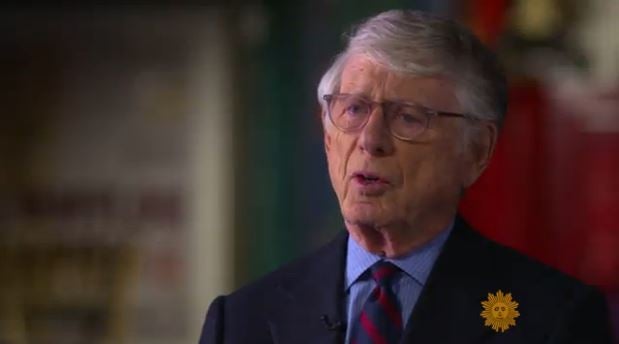 KOPPEL: Rush Limbaugh had a lot to do with creating those two separate worlds, but he couldn’t have done it until 1987 when the Federal Communications Commission did away with the so-called Fairness Doctrine.
KOPPEL: Rush Limbaugh had a lot to do with creating those two separate worlds, but he couldn’t have done it until 1987 when the Federal Communications Commission did away with the so-called Fairness Doctrine.
ORNSTEIN: The Fairness Doctrine basically said that people on radio and television, if they presented one political point of view, had to balance it with the opposite political point of view.
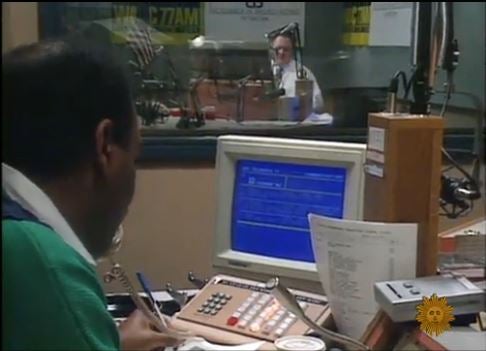 RUSH ARCHIVE: Welcome to the Rush Limbaugh program, a program exclusively designed for rich conservatives and right-minded Republicans and those who want to be either or both.
RUSH ARCHIVE: Welcome to the Rush Limbaugh program, a program exclusively designed for rich conservatives and right-minded Republicans and those who want to be either or both.
KOPPEL: Free of the Fairness Doctrine, Rush Limbaugh and conservative talk radio exploded into a political force of nature.
ORNSTEIN: All of a sudden we live in a world where people can get information and believe it’s absolutely true and not have to get any kind of opposing point of view, and once they believe it, they will always believe it, even if it’s utterly false.
RUSH: It’s surreal to listen to these people. It is literally alternative universe surreal. That’s Norman Ornstein. “All of a sudden we live in a world where people can get information and believe it’s absolutely true and not have to get any kind of opposing point of view.” Mr. Ornstein, you know what you people really need to do is listen to this program. I saw the New York Times did a story — did you see this? The New York Times assigned two people to actually watch Fox News for 18 hours, and they did it a story on it. It was like they’d been dispatched to Mars to report on what Martian life is.
They actually had to watch 18 hours and they reported on it like they were introducing people to a foreign language. It’s the most amazing thing. They don’t listen here. Mr. Ornstein, I do. You talk about opposing points of views, I present a clearer and better picture of liberalism than you or any other liberal does, because I’m honest about what you people believe. Both sides are all over every issue on this program, I give them. In explaining why my side is right I have to explain what you believe and why it’s wrong, and I do. And that’s why people listen. It’s informative, it’s educational, it’s entertaining, and it’s unique.
You people don’t ever explain any alternative view, say, to Obama because you don’t think there are any. And the people that hold them are not worth your time. But we do more opposing views now. I don’t have liberals on the phone ’cause they can’t last 30 seconds without starting to call me names. And it descends into chaos. I mean, we’re open to ’em, if liberals want to be on the program, they can be on any day of the week. In fact. we still put ’em at the front of the line when they call.
How many times in 30 years has this story been done? A hundred, 150, 200, a thousand times? And always at the root of it is the Fairness Doctrine. Yes, you see, without the government intervening, Rush Limbaugh would never have been able to do what he did. Let me explain the Fairness Doctrine to you. It doesn’t exist anyway. The libs would love to have it back, but it’s not gonna happen.
People confuse the Fairness Doctrine with equal-time provisions, and that’s not what the Fairness Doctrine is. The Fairness Doctrine has nothing to do with equal. It sought to penalize radio stations in certain ways but no proscription on the balance has ever been part of any federal law. For example, three hours of this program on the radio station you’re listening to is me. This station could have complied with the Fairness Doctrine by doing 15 minutes of an opposing point of view five hours later.
 The Fairness Doctrine didn’t stop anybody from doing anything. Well, it did because the government regulates broadcasters. The government grants licenses. And broadcasters have to go through ascertainment every five or 10 years to get their licenses renewed, and that’s when they have to show they’re fully serving the community and that’s when they’re having to show they’re programming, how they are balancing this and balancing that, which everybody was. You had to do it to get your license renewed. It did not mean that for three hours after me there had to be a liberal. You could have had a liberal on for one hour at midnight and the Fairness Doctrine would have been complied with.
The Fairness Doctrine didn’t stop anybody from doing anything. Well, it did because the government regulates broadcasters. The government grants licenses. And broadcasters have to go through ascertainment every five or 10 years to get their licenses renewed, and that’s when they have to show they’re fully serving the community and that’s when they’re having to show they’re programming, how they are balancing this and balancing that, which everybody was. You had to do it to get your license renewed. It did not mean that for three hours after me there had to be a liberal. You could have had a liberal on for one hour at midnight and the Fairness Doctrine would have been complied with.
Anyway, Reagan tore it up, got rid of it. I was doing this program for three years before the Fairness Doctrine was gotten away with, or done away with. The Fairness Doctrine didn’t stop me and the Fairness Doctrine did not unleash me. This program stands on its own. The fact that the Fairness Doctrine was eliminated in ’87, the liberals love to explain that because it can’t be my talent, it can’t be the quality of the program, it can’t be anything substantive to explain all of this now conservative alternative media. It has to be the conservatives got rid of a key government regulation. “Sir, we are eliminating the Fairness Doctrine so as to spawn a new conservative media.” That’s not how it happened.
The Fairness Doctrine’s one of the greatest false gods, if you will, straw men that you have ever seen constructed. As I say, I was doing this exact program for three years in Sacramento, California, and, in fact, only one time in those three years was equal time demanded. And you know how we did it? It was some preacher who got mad at something I said who wanted to tell the virtues of life in Senegal, in Africa, as a retort to something I had said. The guy was a professional harasser of radio stations.
So the management came to me, “We’ve got Dr. So-and-so.”
I said, “Bring it in, bring him on. If he’s complaining, we’ll interview him for a half hour.”
“You will?”
“Hell, yes! We’ll promote it for a week. We’ll own the town, bring the guy in.”
We brought the guy in, and he shows up in full Senegal dress, looked like Obama, in fact, in some previous pictures of Obama in Kenya. The guy shows up and he starts talking about what he likes about Senegal as opposed to Atlanta and whatever else his point was. I interviewed him, and he walked out of there, it was 30 minutes, satisfied, he got to be on the radio, and he got to run around and tell everybody that he stood up to Rush Limbaugh.
And that was it. It was not the Fairness Doctrine that demanded that, by the way. It was the management of the station coming to me, “This guy’s a professional harasser,” and they were afraid I was gonna not want this. “Bring him in.” It did not lead to other people wanting the same opportunity. Anyway, all of this is a straw dog. They’re upset that they lost their monopoly. They haven’t gotten over it for 30 years. I’ll tell you one thing I now realize.
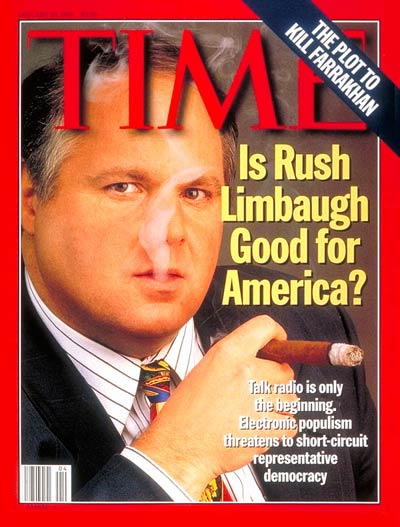 We have the 30th anniversary coming up August 1st, and I figure I have 20 more years doing this, so I figure at some point in the next 20 years I would be given a lifetime award by a national broadcasting or a Hall of Fame, like Howard Cosell got his, but I now know that’s not happening. (laughing) I don’t think I will ever be awarded for anything. I’m being facetious here. I never have thought I was — surprised I’ve been admitted to the two Hall of Fames, and it had to happen before they realized what they had done. I’m sorry. Halls of fame. Not Hall of Fames. It’s like sons-in-law or brothers-in, not brother-in-laws. Anyway, minor error. I corrected it, ’cause I know.
We have the 30th anniversary coming up August 1st, and I figure I have 20 more years doing this, so I figure at some point in the next 20 years I would be given a lifetime award by a national broadcasting or a Hall of Fame, like Howard Cosell got his, but I now know that’s not happening. (laughing) I don’t think I will ever be awarded for anything. I’m being facetious here. I never have thought I was — surprised I’ve been admitted to the two Hall of Fames, and it had to happen before they realized what they had done. I’m sorry. Halls of fame. Not Hall of Fames. It’s like sons-in-law or brothers-in, not brother-in-laws. Anyway, minor error. I corrected it, ’cause I know.
But there aren’t gonna be any of these lifetime achievement awards. There’s not gonna be any recognition because people that are in charge of those awards resent the heck out of what’s happened here. And Ted Koppel is just the latest. Plus I have a little bit of a history with Mr. Koppel. I really liked — it was one of the most unfortunate things in my career that happened. It was a huge disappointment.
BREAK TRANSCRIPT
RUSH: Let me play a couple more sound bites here from Ted Koppel and Hannity before getting into the backstory. This is the sound bite that everybody’s heard associated with the story. This is where Hannity and Koppel go back and forth about Koppel blaming Hannity and conservative media for the divide in America. Hannity said, “You think we’re bad for America?” By the way, reminding you, in 1995 TIME magazine cover story, a picture of me that was Photoshopped. It was a churlish grin. I remember the picture. I posed for it.
They monkeyed around with my mouth, made it look churlish, and they drew some smoke coming out of it, as though I was smoking a cigar, big, fat, evil cigar. It was not a flattering picture. It was dark, it was heavily shadowed. “Is Rush Limbaugh bad for America?” That’s 1995. So seven years I’d been doing it. And the following week, TIME magazine’s cover story was about Fidel Castro and his marvelous efforts to create an island paradise in Cuba. The lion in winter or something. It was just puke-worthy. So Hannity says, “You think we’re bad for America? You think I’m bad for America?”
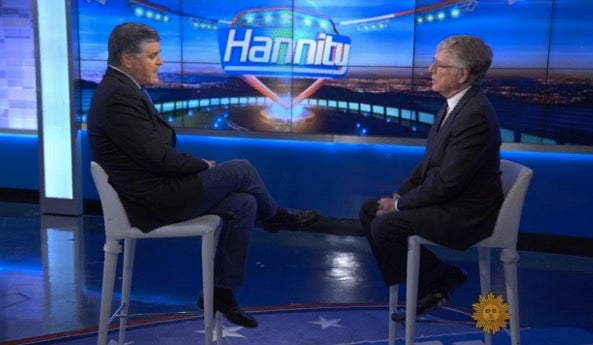 KOPPEL: Yeah. You know why?
KOPPEL: Yeah. You know why?
HANNITY: That’s sad.
KOPPEL: You have attracted people who are determined that ideology is more important than facts.
RUSH: So in Koppel’s world liberalism is nothing but what is, and whatever they say is factual and true and there’s no such thing as bias and there’s no lack of objectivity because it’s just what is, it’s as natural as air and water. And it’s conservatism that is a deviation from the norm. Conservatism is sick, conservatism is abnormal, conservatism is what needs to be stamped out. Conservatism’s perverted, conservatism’s perverse, conservatism is dangerous. And therefore you people listen here not because you learn anything and not because you’re given facts and truth. You listen here because all you want to hear is raw conservatism.
Ted Koppel is not a dumb guy. But these people on the left have such closed minds. They live in their little cocoons. They are made nervous when anything outside their cocoon tries to get in. They shut it out; they ridicule it. I’ve never seen a more collectively scared bunch of people when confronted with things that they don’t already instinctively believe. Many of them cannot even explain why they believe what they believe. They resort to telling you how they feel, but they can’t tell you why they think anything. It’s all about feeling.
But we have destroyed the media because we have made facts irrelevant. And yet these people are the architects of fake news. The numbers of fake news stories on Donald Trump alone could fill an encyclopedia. Skip sound bite three. This is the aforementioned sound bite, number four. This was February 4th, 1992, it was my first time on Nightline.
My mom and dad were watching. My dad couldn’t believe it. I didn’t go to college. I had no business being on this TV show. He couldn’t understand it. He literally couldn’t. He came from the Great Depression, came from World War II. If you didn’t have a college degree you weren’t gonna get meaningful employment. That was such a formative experience.
He was proud, don’t misunderstand, but he couldn’t believe it. It just defied the odds. And my mother told me that when the show was over, he looked at her flabbergasted and said, “Millie, where the hell did he learn all that?” And she told me that she said to him “From you, silly.” It was a classic gut-wrenching, heartrending moment when she told me the story.
And this is just a short little segment of it, but it’s February 4th, 1992, and they’re discussing climate change, global warming, and Algore has just come out as the big proponent. He’s gonna be running for vice president along with Clinton. He hadn’t been nominated yet. This is before all that. The environment had become his gateway issue, and he was an unquestioned expert on it, even though he wasn’t a scientist, either.
I remember after this episode I had so many so-called conservative scientific people just whining and moaning that Koppel had chosen me and saying Koppel chose me specifically so that the side we believe in would lose. All I was was a guy on the radio, I wasn’t a scientist, I couldn’t refute anything Gore said. The bite is this.
Koppel says, “Rush Limbaugh, we’ve –” note the question is how they do things. “Rush Limbaugh, we’ve both run into politicians during our careers who know how to fake it on an issue. I don’t know of anyone on Capitol Hill who is more knowledgeable on the subject of the environment than Algore. You have to take seriously what he says.” See? You have to. He’s the foremost expert on Capitol Hill. Who says? You have to take seriously what he says. The question is designed to get me to acknowledge the expertise of Algore, which I didn’t do it.
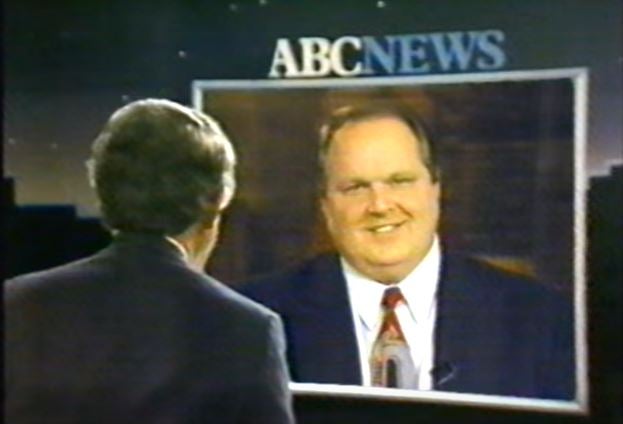 RUSH ARCHIVE: The environmental movement, as fueled by the militants who lead it, I think is the new home of socialism. I think they’ve adopted a constituency here which can’t speak, that is trees and rocks and so forth, and can’t reject the so-called help and concern that the advocates are giving it, and it gives them a stage from which to constantly launch attacks at capitalism.
RUSH ARCHIVE: The environmental movement, as fueled by the militants who lead it, I think is the new home of socialism. I think they’ve adopted a constituency here which can’t speak, that is trees and rocks and so forth, and can’t reject the so-called help and concern that the advocates are giving it, and it gives them a stage from which to constantly launch attacks at capitalism.
RUSH: So I didn’t accede to the premise there that Algore is the world’s foremost authority. But that’s not the backstory. Ted Koppel — I never met him — I offered to take him to dinner once. He said, “That’d be great if you’re ever in Washington,” but it never worked out. But he liked having me on. It’s like a museum piece, “Look what we found here!” There was at this time, in 1992, there was no other media conservative spokesman. The show had started in ’88, and outside of Mr. Buckley at National Review, and he had his own TV show, he did Nightline now and then. So I was on a bunch of times, and they were live. It was always at 11:30.
And one night I’m watching Nightline — I’m not on it — and Barney Frank is. And Barney Frank quotes me as saying something that I didn’t say that was really despicable. I don’t remember what it was, but it was really despicable. It was filthy, it was just awful. And Koppel didn’t correct it. And I actually got a call from him the next day apologizing, saying that he knew I hadn’t said it, that it was somebody else, whoever it was. But the moment had passed and he didn’t get a chance to mention it, but he asked me, “Please do not mention this call on the air. This apology is just from me to you.”
I said silently to myself, “What good does that do me?” As far as the Nightline audience is concerned, I said it, they’re not gonna apologize or retract it or say somebody else said it. So I kind of fumed about it, and some days and weeks went by, and something else happened elsewhere in the media that had me fulminating about how they do things.
So I told this story and I got a call from Mr. Koppel. “I asked you not to mention this, and you did, and I am very disappointed.” And that was the last I heard from him. So it has been 25 years, until this February, when they called and wanted me to be on this show that aired yesterday. And, by the way, there was not one contentious moment. All those times I was on Nightline, it was always respectful.
One of the most fun was a town hall meeting after I think the Clinton — yeah, the Clintons had been elected, it was a town hall meeting, and everybody was in Iowa except me. I was on the set of my TV studio in New York, and it was Carville and Geneva Overholtzer, who was working at the Des Moines Register at the time. There was about 10 of ’em on that panel, and it was one of these special, extra special Nightlines, an hour and a half expanded look into some such thing. I forget what it was. But it involved the Clintons and their lying and prevarications and so forth.
Oh, and one of the guests was Floyd Abrams, the noted First Amendment lawyer, the guy who made a legal career out of the free speech clause of the First Amendment. And the first thing he said when it was his turn to speak (imitating Abrams), “I really object to Mr. Limbaugh being on this program, a person who would actually suggest that a Wall Street rumor that Vince Foster’s body was buried in a cave in Russia” or whatever that rumor was.
And it was fun. The whole show was fun. They were all just reacting to what I said because I was the only one out of 10 people, the only one who thought what I thought. And I gave evidence of the Clintons lie — oh, and I remember pointing out how Hillary had stood there, sat there underneath — the Pretty in Pink. That’s right, that’s what I called the Pretty in Pink press conference and so forth, and Carville got all defensive.
Anyway, I was never treated unfairly or any such way on Nightline. It’s just that one episode led to ongoing silence just because I had notified everybody that Ted Koppel had called and apologized for that Barney Frank slipup. Anyway, I didn’t mean to take so long with that story, but it just reminded me of other adjunctive things. But we’re finished now.
BREAK TRANSCRIPT
RUSH: All right. One more sound bite about all this Ted Koppel-CBS stuff. It’s from Brian Kilmeade at Fox & Friends this morning. They’re talking about this whole report that Koppel did on Sunday. It’s Ainsley Earhardt, Pete Hegseth, and Brian Kilmeade reacting to it.
KILMEADE: They looked at Rush Limbaugh as the enemy!
 HEGSETH: Yeah.
HEGSETH: Yeah.
KILMEADE: Rush Limbaugh came out organically, a guy making $18,000 a year as a salesperson. The country loved him. He became unbelievably successful. That’s an American success story!
HEGSETH: Mmm-hmm. That’s right.
EARHARDT: Well, it just shows you how mainstream media thinks. If they don’t agree with your opinions, they’re gonna sell you as being bad for America.
HEGSETH: That’s right!
RUSH: That’s right. So I appreciate that, Brian Kilmeade and the gang there. I just wanted to give them a shout-out.
BREAK TRANSCRIPT
RUSH: Here’s Jim in San Diego. You’re next. Jim, I’m glad you called. How you doing?
CALLER: Hi. Doin’ fine, Rush. I noticed the Democrats and the liberals who want to take you off the air and say how terrible you are, they’ve certainly repudiated their earlier belief in the First Amendment, the freedom of speech and the freedom of the press, and the idea that competition was the way to make sure the truth gets out.
RUSH: Well, you know, the competition’s a strange thing. They actually… I don’t think in their business want there to be any. And they’ve now been forced to compete by virtue of the existence of this New Media dating back to 1988. I mean, that’s the beauty of monopolies; you don’t have to compete.
CALLER: Yeah.
RUSH: Whatever you do is all people get, so you can do as much or as little as you want.
CALLER: Right, Rush. I’m about 82-year-old of age, and I’ve been around since the fifties as an adult, and I remember when they used to say — when they were in the minority and had the unpopular view — how they would defend your right to speech and to express your views. No matter how much they disagreed with it, they’d defend it to the death. Notice they’ve changed their tune.
RUSH: Excellent point. They do want to police speech, and I think that’s what this media shaming is really all about. But what it adds up to… I can’t speak for them, but I sit here every day from noon to three, five days a week, 15 hours a week, however many hours that is over almost 30 years now. Well, 28 and a half. I have never once been bothered that there’s anybody else out there doing this. I have never wished that whoever else was out there wasn’t, and I have never sought ways to make it impossible for them to do what they do.
It never even crosses my mind. Not once!
I mean, not even dreaming about it. I never even dream about, “Wouldn’t it be great if there was nobody but me?” Never happens. It’s so unrealistic. It would be insane to think like that. But they do! They are obsessed with silencing anything they don’t agree with. I mean, literally obsessed by it. And if they could, they would use the full force of government and the law. If they could, they would use jail. But they’re truly bothered by it. The thing I don’t get in my case — going in a reverse trajectory here — is, you know, I come here every day confident that what I believe is true, that what I believe is right.
I’m confident that the backup I’ve assembled in terms of facts and details is accurate, because I know if it isn’t, I can always correct it, either the next hour, the next half hour, the next day. As such, I’m not bothered at all that there’s anybody else out there, even doing what I do the way they do it, even that they’re liberal talk shows, liberal media, liberal shows. It doesn’t bother me. The notion of having to earn whatever share of the audience I get in this giant arena is something I’ve always accepted that it’s up to me to earn it.
 And there are a whole lot of things that you have to do to earn it. And after you earn it, it becomes even harder to keep it. But they obviously don’t think this way. These people… The Koppel report? They’re obsessed with discrediting us or eliminating us. Why? It makes me believe that they’re not confident that what they have or what they do can stand on its own, that the only way it can stand is if there isn’t any opposition to it. Because if there’s opposition — if there are people pointing out the flaws or the bias or the things that are wrong — then they’ve got problems.
And there are a whole lot of things that you have to do to earn it. And after you earn it, it becomes even harder to keep it. But they obviously don’t think this way. These people… The Koppel report? They’re obsessed with discrediting us or eliminating us. Why? It makes me believe that they’re not confident that what they have or what they do can stand on its own, that the only way it can stand is if there isn’t any opposition to it. Because if there’s opposition — if there are people pointing out the flaws or the bias or the things that are wrong — then they’ve got problems.
But I don’t… I’ve never worried about this. It’s a… Maybe it’s a confidence thing. Maybe it’s an understanding how capitalism works. Maybe it’s a lack of fear of competition. But it has never once occurred to me that the way to success and the route to power is shutting everybody else up. But, man, every one of them — every one of them — look at it that way. And they make no bones about it. TIME Magazine in 1994, Ted Koppel yesterday: “Is Rush Limbaugh Bad For America?” The Washington Post: “Is There Too Much Democracy Going on?”
Bill Clinton calling KMOX in St. Louis on Air Force One complaining that I have three hours every day and that “there’s no truth detector”? There isn’t? There’s only the rest of the giant… In 1992, remember, this show was it. So he’s complaining about one show, versus all the rest of the media! Now, let’s get serious. One show versus all the rest of the media is not gonna make a dent in what they do. It’s the fact… Well… (sigh) Okay, let me put it this way. One show in the universe of all of theirs did not harm them in terms…
They still had the same number of voices. They still had the same number of newscasts. They still had every opportunity to reach people every day. It’s just that I was added to the mix. (interruption) Well, over time their viewership in certain cases… Yeah, it has plummeted, it’s bifurcated, it’s been spread out and so forth. There’s no question it has, and maybe they feared that when it all began. But it just strikes me as paranoid and insecure to look at all of this the way they do. And the way they look at Fox News is the exact same way.
The New York Times assigning two reporters to watch — for the first time — Fox News for 18 hours and report back to the editor what they found. The editor didn’t even want to turn it on and watch it himself to find out, and it’s just a cable channel. But he couldn’t bear to do that. He had to assign a couple of minions to go through the torture of actually watching Fox News. Anyway, they pose a threat because they actively seek ways to silence people they don’t agree with. And they have the audacity to say that Trump is Hitler!
By the way, for all of you leftists out there who think that Trump’s Hitler, that Trump’s an autocrat, that Trump’s a tyrant? Then how did the health care bill fail? If Trump’s all of this horrible stuff, why didn’t he just order it done — and if he didn’t get the votes, shoot the people that didn’t support it? Why’d he do the things that Hitler did? You have to reverse it to get to who’s really who, who’s really the authoritarians, who are the intolerant ones.


